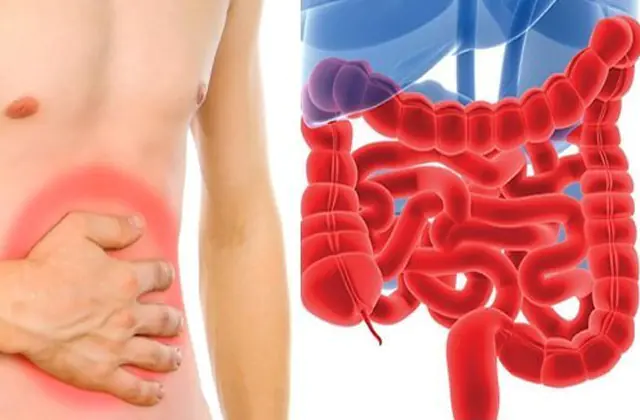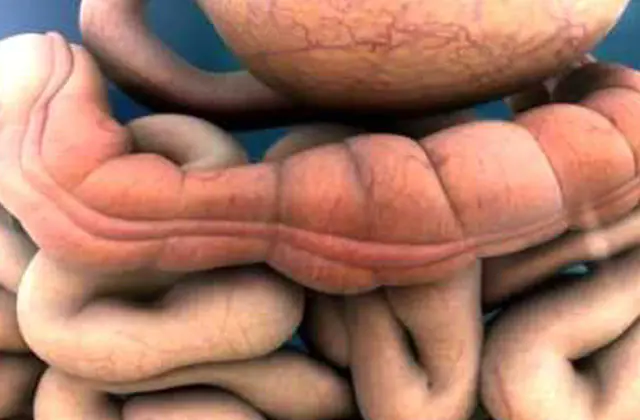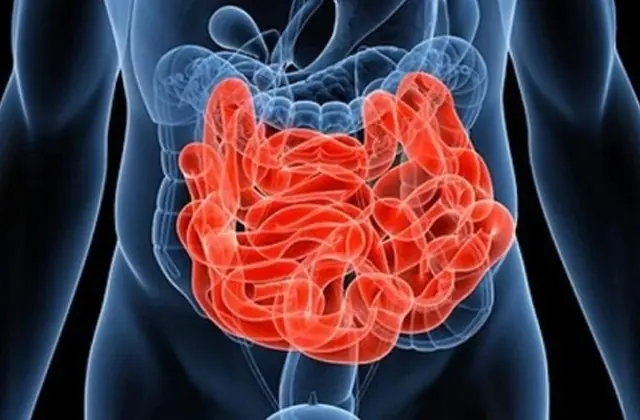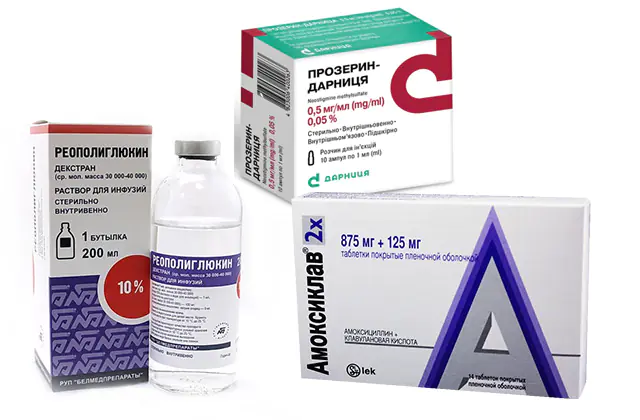
What is intestinal paresis, the reasons for its development. Symptoms and methods of detection. Treatment with medications and folk remedies, methods of prevention.
The content of the article:- Causes of intestinal paresis
- Symptoms and diagnosis
- Treatment options
- Medicines
- Folk remedies
- Prevention
Intestinal paresis is a condition that is observed in patients with severe diseases of the gastrointestinal tract, respiratory system, cardiovascular system, as well as extensive infections. With paresis, the tone of the intestinal wall decreases and paralysis of its muscles develops.
Causes of intestinal paresis

Intestinal paresis is a condition that leads to a slowdown in peristalsis of the organ. This is one of the most severe gastroenterological disorders, which is difficult to treat. The risk group includes people using medications that disrupt the motor activity of the gastrointestinal tract, patients with electrolyte and metabolic disorders, generalized infections, and chronic inflammatory pathologies.
The causes of intestinal paresis lie in the disruption of blood flow to the intestinal walls, as a result of which nervous regulation is disrupted. This condition often develops as a result of damage to the peritoneal organs. It is observed in patients with acute appendicitis, purulent peritonitis (develops with gastric ulcer, perforation of the gallbladder walls), acute pancreatitis, pancreatic necrosis, intestinal obstruction. It also develops with myocardial infarction, hepatic colic, and pneumonia.
Conditions that cause disruption of nerve conduction with subsequent development of paresis include injuries and tumor formations affecting the spinal cord, surgical therapy of the gastrointestinal tract, intoxication due to the breakdown of pancreatic tissue, the use of certain groups of medications (calcium channel blockers recommended for people with hypertension) .
Important! The functional state of the intestine depends on the age, anatomical and physiological characteristics of human development. Paresis is more often detected in old age, so this disorder falls into the category of senile disorders.There are 3 degrees of intestinal paresis:
- The motor activity of the gastrointestinal tract slows down or completely stops.
- Stagnant processes develop and intra-abdominal pressure increases. The intestinal loops gradually increase in diameter.
- The intestinal walls become thinner, and the intestinal contents penetrate into the systemic bloodstream, which provokes general intoxication of the body.
The fight against intestinal paresis begins with normalizing the motility of the gastrointestinal tract and using symptomatic treatment. In severe cases, surgery is required.
If efforts have not been made in a timely manner to combat intestinal paresis, this is fraught with serious complications: pathological holes in the intestinal walls, diverticula, peritonitis, and gastric bleeding. Postoperative intestinal paresis is one of the most common complications. It occurs in people who have a history of extensive abdominal surgery.
The prognosis depends on the patient’s age, how timely the appropriate treatment was selected, and the presence of complications. For patients over 70 years of age, the prognosis is more unfavorable due to the risk of recurrence of paresis. Chronic ileus often develops, a condition in which a bolus of food cannot pass through the gastrointestinal tract.
Symptoms and diagnosis of intestinal paresis

Signs of intestinal paresis are accompanied by pain and bloating, dyspeptic disorders, and deterioration in general well-being. Pain may not have a clear localization and spread to the entire abdominal area. Often they do not radiate to other organs and parts of the body. They are aching, tolerable, have average intensity and are accompanied by abdominal discomfort.
The clinical picture of intestinal paresis is often supplemented by the following manifestations:
- Dyspeptic disorders in the form of complaints of nausea, bloating, constipation. Progression of the disorder leads to vomiting.
- In emetic massage, elements of undigested food with admixtures of gastrointestinal secretions are found.
- In severe cases, the vomit smells like feces.
- Regular vomiting leads to a serious complication - dehydration of the body, which is accompanied by dry skin and mucous membranes, dry mouth, and a decrease in the amount of urine.
Lack of therapy leads to a deterioration in the patient’s general well-being and impaired absorption of nutrients in the small intestine. The breakdown products of the intestinal contents enter the general bloodstream, which provokes general intoxication of the body. There are complaints about a feeling of weakness and fatigue, performance is impaired, and body weight decreases. A regular increase in body temperature to 37.1-37.4 degrees is possible. Higher rates are observed with complications of paresis.
In the process of diagnosing intestinal paresis, the gastroenterologist examines the patient in detail: pays attention to how enlarged the abdomen is, whether there is bloating, dryness of the tongue and mucous membranes. During palpation, patients complain of pain in the anterior wall of the abdominal cavity. Digital examination of the rectum: expansion, presence of voids in its final segment. The doctor also taps the stomach and listens to it using a phonendoscope.
Additionally, elements of instrumental diagnostics are used. Radiography allows one to differentiate paresis from intestinal obstruction. Using x-rays of the peritoneal organs, it is possible to visualize how much the intestinal loops are filled with gaseous contents and whether there is free fluid. Using fibrogastroduodenoscopy, it is determined how swollen the duodenum is and in what condition its internal walls are. The use of colonoscopy and irrigoscopy makes it possible to identify the functional state of the colon.
Important! Ultrasound diagnostics and magnetic resonance imaging are ineffective in examining the gastrointestinal tract to detect paresis.The patient is also recommended for laboratory diagnostics: using a general blood test, anemia is detected, which indicates intestinal bleeding. The stool is also examined for the presence of blood impurities. Only an experienced gastroenterologist or surgeon can answer the question of what to do in case of intestinal paresis, taking into account the results of a comprehensive diagnosis.
Methods for treating intestinal paresis
If this disease is suspected, the patient should be immediately hospitalized in the nearest surgery department, in the intensive care ward. Treatment of intestinal paresis is complex: it involves the use of medications and dietary adjustments. Medicines are selected with extreme caution so as not to provoke the development of complications. Efforts are directed towards eliminating the underlying condition that provoked such a violation. To unload the intestines, surgery may be required for intestinal paresis.
Medicines for the treatment of intestinal paresis

The doctor tells the patient in detail how to treat intestinal paresis. To stimulate the gastrointestinal tract and make you feel better, the patient is asked to remain in the knee-elbow position, give preference to moderate physical activity under the supervision of a doctor, and use chewing gum.
To reduce the load on the gastrointestinal tract, a gas outlet tube or nasogastric tube is used, and a colonoscopy is performed.
To make you feel better with intestinal paresis, it is recommended to use the following groups of medications:
- Neostigmine. A drug to stimulate intestinal motility. If the medicine is ineffective, then it is required to infuse it without interruption, intravenously, by drip. The duration of such a procedure is 24 hours or longer as prescribed and under the constant supervision of a doctor. This method of therapy is effective in more than 70% of cases of treating patients with paresis. If a decrease in pulse rate is observed during the administration of Neostigmine, the use of Atropine is indicated. Cost - 60 rubles. (22 UAH). Analogue - Prozerin.
- Amoxiclav. A drug for the prevention of secondary infection in the treatment of intestinal paresis with a complex composition of a wide spectrum of action, which has an effect on gram-positive and gram-negative microorganisms. A combined product based on Amoxicillin and clavulanic acid is available in the form of tablets for internal use. The course of treatment is up to 2 weeks. The dosage is selected individually, taking into account the severity of the pathological process, age and individual characteristics of the patient’s body. Price — 250 rub. (90 UAH). Analogs: Abiklav, Amklav, Amoxicar Plus.
- Reopoliglyukin. A plasma substitute drug that is prescribed to normalize blood microcirculation. Available in the form of an injection solution. The active component Dextran reduces blood viscosity and normalizes blood pressure. The medicine is used for extensive blood loss to raise blood pressure and keep it at a high level. Intravenous drip administration of the medication is indicated, which is preheated to 36 degrees. Cost - 220 rubles. (80 UAH). Analogues: Polydextran, Poliglyukin.
- Cerucal. An antiemetic that contains metoclopramide. Used in the treatment of postoperative paresis. Reduces nausea, vomiting, eliminates hiccups. Cerucal is available in the form of a solution for injection and tablets for internal use. The price is 120 rubles. (43 UAH). Analogue - Metoclopramide.
- Compligam V. The treatment regimen for intestinal paresis must be supplemented with vitamin supplements. The complex multivitamin product Compligam B based on B vitamins and the anesthetic Lidocaine is available in the form of an injection solution and tablets for internal use. The drug stimulates blood circulation, exhibits local anesthetic and multivitamin properties. Used for nerve patency disorders. Therapy begins with intravenous deep administration of 2 ml of solution for 1 week, after which they switch to internal administration of tablets. Compligam B is contraindicated in childhood, with individual intolerance to the active components, and in the treatment of patients with acute heart failure. The price is 230 rubles. (82 UAH). Analogs: Kombilipen, Milgamma.
Folk remedies against intestinal paresis

Folk remedies for treating illness are used as a complement to basic therapy selected by a doctor.
Features of treating intestinal paresis at home:
- Patients are recommended to take white clay. The powder is sifted through a sieve and 20 g of the product is dissolved in a glass of water. Take on an empty stomach, 20 minutes before meals. The course of treatment is 2 weeks. After this, you need to take a 14-day break, and the course of treatment can be repeated.
- A tablespoon of marjoram is mixed with chamomile flowers, pour 0.5 liters of boiling water and leave for 15 minutes. Strain, take 1/3 cup three times a day before meals.
- Peony roots are poured with hot water and boiled in a water bath over low heat. Leave for 60 minutes, filter, take 50 ml twice a day before meals.
- The rose hips are crushed, boiled for 5 minutes, removed from the heat and left for 20 minutes. Add honey to the chilled drink and take 1 glass per day.
- Bay leaves (20 g) are poured with olive oil and left in a dark, cool place for 20 days. The resulting product is heated in a water bath and rubbed into the affected areas of the body for intestinal paresis three times a day.
- Black elderberry is poured with boiling water and left for 1 hour. The resulting product is filtered and taken 0.5 cups twice a day. The course of admission is 10 days.
- Pine needles are mixed with cones and branches, poured with water and boiled for 15 minutes. The broth is removed from the heat, left for 10 hours and used to prepare pine baths.
- Chamomile flowers are mixed with mint and elderberry, poured with boiling water, and left for 2 hours. Take 100 ml 2-3 times a day before the main meal. The herbal collection can be enriched with calendula, violet, buttercups, St. John's wort, and rosemary leaves.
- Pine nuts are crushed, goat milk is added. The resulting product must be brought to a boil to form foam at least 4 times. The nuts are softened, honey and sprouted wheat are added. Take 2-3 times a day for a week.
Freshly squeezed juices are also used in the treatment of intestinal paresis. A combination of carrots with spinach, celery, green salad, and red beets is recommended. They also drink birch sap - 1 glass twice a day. Juices normalize the digestion process, accelerate the elimination of toxic substances, normalize metabolic processes, have an anti-inflammatory effect, and have a beneficial effect on the processes of nervous regulation in the gastrointestinal tract.
Note! Nutrition for intestinal paresis is limited. The diet involves complete abstinence from food from the first hours of admission to the hospital in order to reduce the load on the gastrointestinal tract.Prevention of intestinal paresis
To prevent intestinal paresis, it is recommended to prevent, promptly identify and treat pathologies that provoke such a complication. Exacerbation of appendicitis, cholecystitis and pancreatitis in purulent form, blood poisoning, intestinal obstruction are indications for immediate surgical intervention.
Medicines, especially calcium channel blockers, should only be taken as indicated and under the supervision of a physician.
When performing surgery, care must be taken not to damage the nerve endings. To do this, the intestinal tissue is moved using tampons and a scalpel is not used.
At the first manifestations of intestinal paresis, it is important to stop self-medicating and seek emergency medical help as soon as possible.
Video about postoperative intestinal paresis in obstetric practice:



